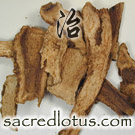Mu Xiang (Costus Root, Saussurea)
Herb 11 of 19 in Herbs that Regulate the Qi
Buy This Herb
Get free shipping from
our partners at CHD
our partners at CHD
Chinese Herb Actions
-
Moves Qi, Relieves Pain, Regulates the Middle Jiao
Used for symptoms of Qi stagnation of the Spleen and Stomach including poor appetite, indigestion, food stagnation, epigastric and abdominal fullness, bloating, pain, diarrhea and tenesmus. Also relieves flank pain, distension, and soreness as well as bitter taste, yellow tongue coat, and possible jaundice associated with Liver Qi stagnation. - Strengthens the Spleen and Prevents Stagnation
Used for Spleen Qi Deficiency symptoms including abdominal fullness, distention, bloating, pain, poor appetite, vomiting, and diarrhea. Helps ameliorate the side effects of tonifying herbs.
Chinese Herb Contraindications & Cautions
- Do not use with Yin Xu Fire, Depleted Fluids, or Blazing Fire.
Herb-Drug Interactions
- Section not completed...
Chinese Herb Toxicity & Overdose
- One case of allergic reaction has been reported after ingestion of 10 grams. The same patient reacted to a smaller dose of 3 grams as well. Symptoms include abdominal discomfort, watery diarrhea, granular rash, pruritus, and restlessness.
- Section not completed...
Chinese Herb Dosage
- 3-9 grams in decoction (Bensky)
- 3-10 grams in decoction (Chen)
This Herb Appears in the Following Formulas:
- Fei Er Wan (Fat Baby Pill)
Category: Formulas that Expel Parasites - Gui Pi Tang (Restore the Spleen Decoction)
Category: Formulas that Tonify the Qi and Blood - Hei Xi Dan (Lead Special Pill)
Category: Formulas that Rescue Devastated Yang - Hou Po Wen Zhong Tang (Magnolia Bark Decoction for Warming the Middle)
Category: Formulas that Promote the Movement of Qi - Hui Chun Dan (Return of Spring Special Pill)
Category: Formulas that Clear Heat and Open the Orifices - Jian Pi Wan (Strengthen the Spleen Pill)
Category: Formulas that Reduce Food Stagnation - Ju He Wan (Tangerine Seed Pill)
Category: Formulas that Promote the Movement of Qi - Juan Bi Tang (Remove Painful Obstruction Decoction from Medical Revelations)
Category: Formulas that Dispel Wind-Dampness - Mu Xiang Bing Lang Wan (Aucklandia and Betel Nut Pill)
Category: Formulas that Reduce Food Stagnation - Shao Yao Tang (Peony Decoction)
Category: Formulas that Clear Damp-Heat - Shi Pi Yin (Bolster the Spleen Decoction)
Category: Formulas that Warm and Transform Water and Dampness - Su He Xiang Wan (Liquid Styrax Pill)
Category: Formulas that Warm and Open the Orifices - Tian Tai Wu Yao San (Top Quality Lindera Powder)
Category: Formulas that Promote the Movement of Qi - Zhen Ren Yang Zang Tang (True Man's Decoction to Nourish the Organs)
Category: Formulas that Restrain Leakage from the Intestines - Zhou Che Wan (Vessel and Vehicle Pill)
Category: Formulas that Drive Out Excess Water - Zi Xue Dan (Purple Snow Special Pill)
Category: Formulas that Clear Heat and Open the Orifices






